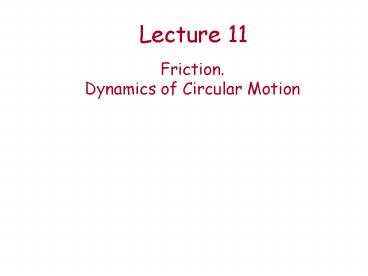Friction' Dynamics of Circular Motion - PowerPoint PPT Presentation
1 / 23
Title:
Friction' Dynamics of Circular Motion
Description:
... 'slows down' the ... A box s down an incline with angle ? = 45 . The ... of static friction between Jacob's pants and the merry-go-round is ... – PowerPoint PPT presentation
Number of Views:77
Avg rating:3.0/5.0
Title: Friction' Dynamics of Circular Motion
1
Lecture 11
- Friction. Dynamics of
Circular Motion
2
ACT Scale
- A 40N block is hung from a rope attached to a
scale. The scale is attached to a wall and reads
40N. What will the scale read when it is instead
attached to another 40N block, as shown in the
second figure?
A. 0 N B. 40N C. 80N
3
The forces on the scale are exactly the same!
4
Going 2D Incline and pulley
Find the acceleration of the boxes when the
system below is released. Friction is negligible.
2m
m
35?
5
1. Draw free body diagram for both boxes.
2. Select axes
3. Write Newtons 2nd law
2m
m
35?
6
4. Solve equations
If ? lt30?, a lt 0
7
Friction
Friction always opposes relative motion.
v
fk box, table
It is caused by microscopic interactions
between two surfaces.
8
Surface friction (solid-solid)
Kinetic friction When the relative motion
between the two objects is not zero. It slows
down the sliding motion.
Example A box sliding on a horizontal table will
eventually stop.
Static friction When the relative motion between
the two objects is zero. It prevents the sliding
motion from happening.
9
Kinetic friction
When the relative motion between the two objects
is not zero. It slows down the sliding motion.
Experimentally, it is observed that the kinetic
friction force between two surfaces
- Is parallel to the surface (and thus
perpendicular to the normal)
- Its magnitude does not depend on the speed
(except when v 0) or on the area of the contact
surfaces.
10
EXAMPLE Box on incline with friction
A box slides down an incline with angle ? 45.
The coefficient of kinetic friction between the
box and the plane is µk 0.2. Find the
acceleration of the box.
?
11
x Wx fk ma Y N Wy 0
NB,I
fk B,I
WB,E
?
12
Static Friction
When the relative motion between the two objects
is zero. It prevents the sliding motion from
happening.
13
Experimental facts about static friction
- It is found that fS MAX µSN, so
- µs coefficient of static friction
- (depends on the
materials)
fS µSN
- Its magnitude does not depend on the area of the
contact surfaces.
- µS µk (Otherwise things would not keep
moving!)
14
Example Trying to move a trunk
friction
Fby you
fS by floor
fk by floor
µsN
µkN
Fby you
15
Example Trying to move a trunk
Fby you
You increase the applied force even more.
Eventually, the trunk moves. Static friction
cannot be larger than a certain value.
Fby you
And then friction becomes kinetic!
fk by floor
fS by floor
16
Car
The static friction between the tire and the road
pushes the car forward.
17
Braking
When you brake normally, the kinetic friction
between the brake pads and the rotors (disks that
turn with the tires) slow you down.
If you block the tires (no ABS!), you skid on the
road. The kinetic friction between the road and
the tires slows you down. This is less effective
(pads and disks are designed to have a huge µK
and the normal force between them is also very
large) ?and very bad for your tires
? 0
18
ACT Book against wall
When you push a book against a wall, the static
friction between the wall and the book can
prevent it from falling. If you press harder,
the friction force will be
A. Larger than before B. The same C. Smaller than
before.
19
For the book not to fall down, fS W
Pushing harder (increasing Nbook,hand) increases
Nbook,wall and therefore fS MAX increases, but
not the actual value of fS that we had, which
needs to continue to be exactly W !
20
Dynamics of circular motion
Conceptually, theres nothing new. All we need is
an appropriate net force to produce the
appropriate acceleration.
Be careful This is not some additional force!
21
Who exerts the centripetal force?
22
EXAMPLE Merry-go-round
Little Jacob (15 kg) sits on the edge of a
merry-go-round of radius 1.0 m while big sister
makes it turn faster and faster. How fast can
the system go before Jacob takes off if the
coefficient of static friction between Jacobs
pants and the merry-go-round is 0.5?
23
Little Jacob (15 kg) sits on the edge of a
merry-go-round of radius 1.0 m while big sister
makes it turn faster and faster. How fast can
the system go before Jacob takes off if the
coefficient of static friction between Jacobs
pants and the merry-go-round is 0.5?































